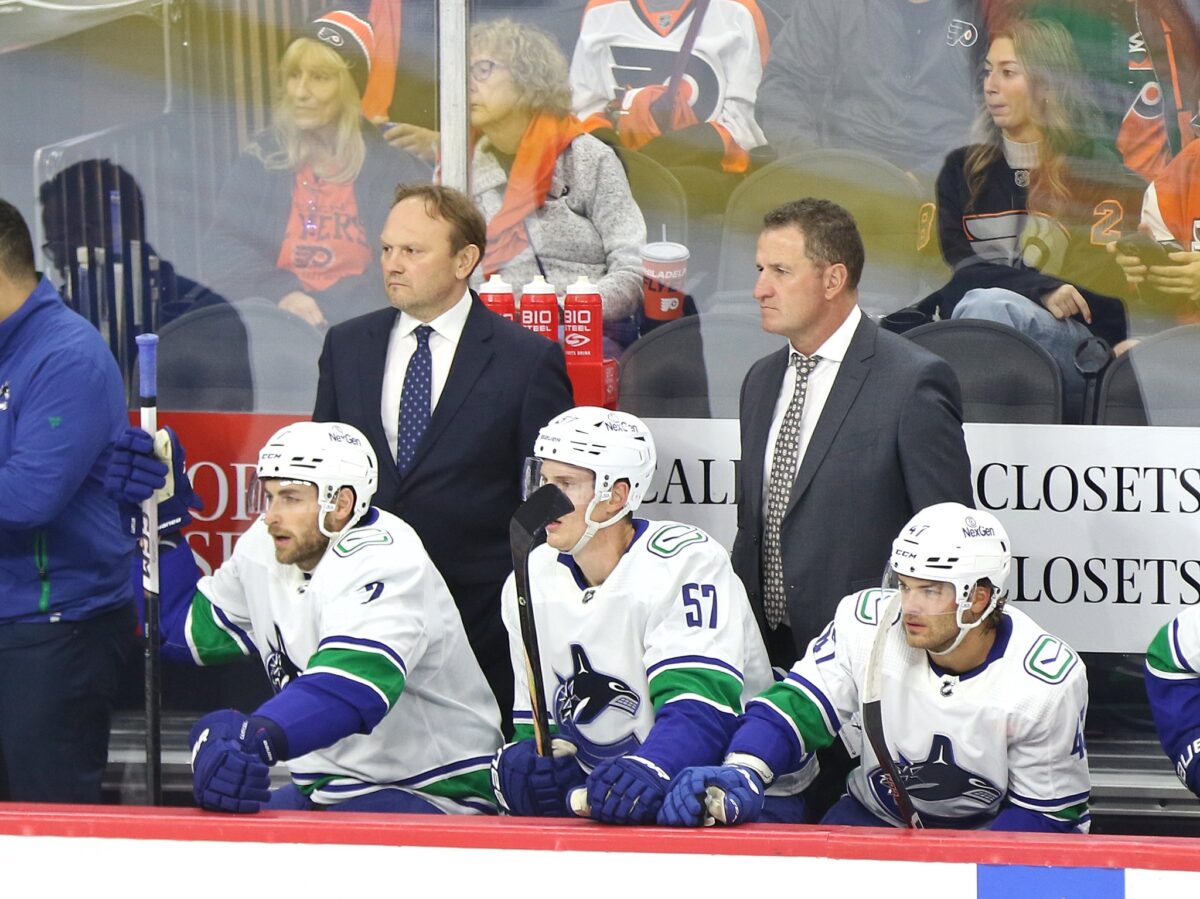As the Vancouver Canucks prepare for their Round 1 matchup against the Nashville Predators, the topic of playoff inexperience looms large. Iain MacIntyre and Dan Murphy recently discussed this issue and how the Canucks might respond to the Predators targeting their skilled players in the upcoming series.
The conversation can be seen and heard below.
2 Key Topics Emerged in the Conversation: Inexperience & Size
The interview shed light on the perspectives of players with significant playoff experience. What are their insights into what should be expected from postseason hockey? Ian Cole, a defenseman with nine straight playoff appearances, emphasized that players entering their first playoffs truly don’t comprehend the intensity until they experience it firsthand.
Related: What Blueger, Suter, and Lafferty Have Brought to the Canucks
Adam Foote, a Canucks’ assistant coach with 170 playoff games and a Stanley Cup, highlighted the challenge for newcomers to maintain their regular game amid heightened atmosphere and pressure. The learning curve is steep, and many Canucks players will gain invaluable playoff wisdom as the series progresses.
A second concern was raised about the Canucks’ lack of size up front, particularly among their skilled forwards. With Nashville likely to target players like Elias Pettersson physically, similar to how the Boston Bruins did in the Canucks’ last Stanley Cup Final appearance in 2011, the key will be how Vancouver responds. It’s not just about the targeted players but the team’s collective response and discipline, especially considering Nashville’s potent power play.
Foote’s Advice Was Interesting and Worth Considering
Foote’s extensive playoff experience gives him unique insight. He shared the challenges players face during their first postseason and emphasized the importance of maintaining consistency in one’s game despite the intensity of playoff hockey.

According to Foote, the biggest challenge for players new to the playoffs is understanding that they don’t need to change their approach drastically. Instead, they should focus on playing like they have all year. This might seem counterintuitive when surrounded by the electrifying atmosphere of playoff hockey, where emotions run high and the pressure to perform intensifies.
However, Foote’s advice emphasizes the mental aspect of playoff hockey—staying composed, sticking to one’s strengths, and not letting external factors alter their game. By maintaining this “regular” mindset, players can engage in the playoffs more effectively and contribute positively to their team’s success.
Coach Rick Tocchet Talks About Embracing the Pain
Canucks head coach Rick Tocchet emphasized the need to embrace the physicality and toughness of playoff hockey, acknowledging that it will be challenging and painful but ultimately defining. The Canucks must prepare for the intensity and grit of postseason play, relishing the battle and accepting the physical toll that comes with it.
Tocchet’s remarks about “embracing the pain” encapsulate the mentality required for success in playoff hockey. He emphasized the grueling nature of postseason play and encouraged players to embrace the physical and emotional challenges that come with it.
Related: What the Canucks Can Expect From the Predators in Round 1
According to Tocchet, playoffs are tough and demanding, characterized by intense battles on the ice that often result in physical discomfort and injuries. Instead of shying away from these hardships, Tocchet urged players to welcome them as essential parts of their playoff experience.
Tocchet’s message extends beyond mere acceptance of pain; it speaks to a deeper mindset shift where players find motivation and satisfaction in enduring these challenges. The walk back to the bus after a game, limping and bruised, symbolizes the sacrifices and effort exerted to achieve victory.
Game 1 Is Set for Tonight: First Home Playoff Game in 9 Years
With Game 1 set to mark the Canucks’ return to playoff action in their home arena after nine years, the team faces a daunting (yet exciting) challenge against the Predators. How they navigate the pressures of playoff hockey and respond to Nashville’s tactics will determine their success in this series.
Foote’s perspective could become a guiding principle for the Canucks’ young roster, many of whom are entering their first NHL postseason – at least with fans in attendance. As they face the Predators’ physicality and strategic challenges, Foote’s words highlight the importance of mental fortitude in overcoming playoff obstacles.
Tocchet believes players should embrace the pain and adversity of playoff hockey because it demonstrates their resilience and commitment to their team’s goals. His words could serve as a rallying cry for his Canucks as they prepare for their first playoff game. It reminds them of the sacrifices required and the rewards that await those who persevere through adversity.
